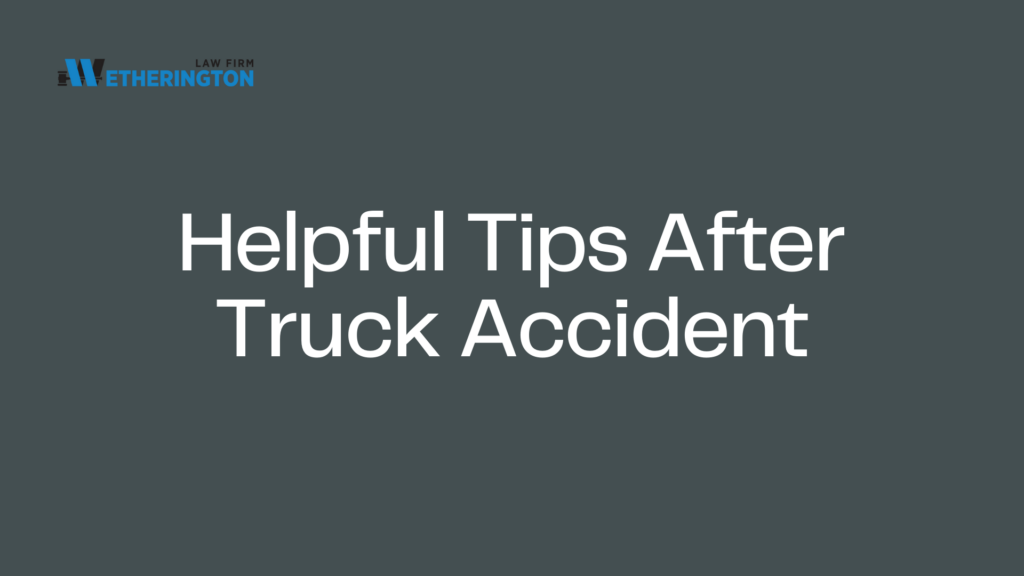How to Handle a Truck Accident with Multiple Injuries
Posted by Wetherington Law Firm | Articles, Truck Accidents
- Articles
- Artificial Intelligence
- Car Accidents
- Class Action Lawsuit
- Comparative Negligence
- Crime Victim
- Damages
- Defective Vehicles
- Disability
- Kratom Death and Injury
- Legal Marketing
- Motor Vehicle Accidents
- News/Media
- Other
- Pedestrian Accidents
- Personal Injury
- Results
- Sexual Assault
- Truck Accidents
- Uber
- Wrongful Death
Categories

Key Highlights:
- Step 1: Call 911: Ensure safety and request help for multiple injuries.
- Step 2: Take Photos: Document vehicles, road conditions, and any cargo issues.
- Step 3: Exchange Info: Share details with the driver; collect witness contacts.
- Step 4: Get Police Report: Provide details to police and request a copy.
- Step 5: Notify Insurance: Report the accident with all gathered evidence.
Truck accidents in high-traffic or residential areas can have devastating impacts, often resulting in severe or multiple injuries. If you find yourself in such a situation, it’s essential to know the right steps to take for everyone’s safety and to protect your rights in any ensuing claims. Here’s a straightforward guide to help navigate through the complex aftermath, ensuring you have the support and documentation needed to handle the situation effectively.
Step 1: Ensure Safety and Call for Medical Help
In any accident, safety is the priority. Move to a safe location if possible, away from traffic or spilled cargo, and immediately call 911. Mention that multiple injuries are involved, so responders are prepared. Even if injuries appear minor, getting prompt medical attention is essential since symptoms of serious issues, like concussions or internal injuries, may not show up immediately. Detailed medical documentation is crucial for connecting injuries to the accident, especially when it comes to seeking for compensation for handling medical bills and filing other types of injury claims.
Step 2: Document the Accident Scene Thoroughly
Documenting the scene carefully is vital for supporting your claim. Use your phone to take photos or videos, capturing key details like vehicle damage, road conditions, weather, and any visible injuries. If the truck cargo was unsecured or improperly loaded, capture this too—it can be important for proving driver negligence or identifying any fault on the part of the trucking company.
Step 3: Collect Contact Information and Witness Statements
Exchange contact and insurance details with the truck driver and anyone else involved. Note the trucking company’s name as well, as they may be liable if the driver was on duty. Gather contact information from any witnesses, asking if they’d be willing to provide statements.
Witnesses can offer unbiased accounts, especially if they noticed unsafe driving, such as speeding or sudden lane changes. Their observations may play a crucial role in establishing facts and proving negligence in your claim, giving a more complete picture of the incident.
Step 4: File a Police Report
When police arrive, provide an accurate and clear account of what happened, highlighting any unsafe actions by the truck driver or conditions that may have contributed to the accident. Request a copy of the police report, as it serves as an essential piece of documentation for your case. Police reports are invaluable for insurance claims and legal proceedings, as they typically include witness statements and preliminary fault assessments—key details that help establish accident facts and responsibility.
Step 5: Notify Your Insurance Company
Contact your insurance provider promptly to report the accident, sharing all factual information without guessing who may be at fault. Include your medical records, photos, and witness statements to support your claim. Understanding the (accident timeline) is important, as claims involving multiple injuries and commercial vehicles can take longer to process due to the complexity of liability and compensation calculations. Submitting complete and accurate documentation will help ensure a smoother process.
How Can a Lawyer Help After a Truck Accident?
When multiple injuries and parties are involved, having an experienced Atlanta personal injury lawyer on your side can be invaluable. Here’s how a lawyer can help:
- Evaluating Liability: A lawyer can identify all responsible parties, such as the truck driver, the trucking company, or even third-party contractors involved in vehicle maintenance, ensuring the right parties are held accountable.
- Collecting Evidence: Attorneys can gather critical evidence, such as traffic camera footage, company records, and inspection logs. This evidence is especially important for (proving driver negligence) and other types of fault.
- Navigating Insurance and Claims: Lawyers understand how to deal with insurance companies and can negotiate on your behalf to ensure fair compensation, covering everything from immediate medical expenses to potential (compensation for emotional distress).
- Court Representation: If a settlement isn’t reached, an attorney can represent you in court, focusing on terms like “liability” and “damages” to maximize your compensation and ensure long-term needs are met.
Talk to a Truck Accident Attorney Today
Truck accidents can be overwhelming, especially when multiple injuries are involved. Consulting with a knowledgeable truck accident attorney ensures that you’re not navigating this complex process alone. Our Atlanta truck accident lawyers bring expertise to your case, helping with everything from gathering evidence to negotiating with insurance companies. They work to ensure you receive the compensation you deserve for medical expenses, lost wages, and other impacts.
Contact us for a free consultation or call (404) 888-4444. You won’t have to pay unless we win your case!
Conclusion
Handling a truck accident with multiple injuries requires swift action, thorough documentation, and often, legal support. Prioritizing health, gathering detailed evidence, and consulting a lawyer can greatly impact the outcome of your claim. Taking these steps not only safeguards your well-being but also ensures you have the strongest case possible for fair compensation, covering both immediate and long-term needs.
All our cases are handled on a contingency basis so you do not have to pay us until we win. Contact us today for a free case evaluation.